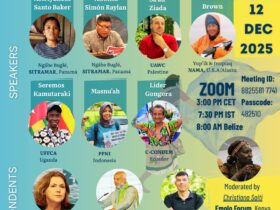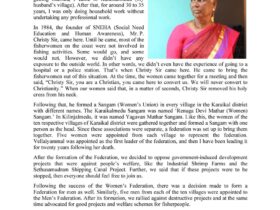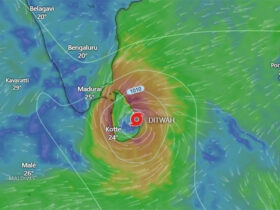Statement made by: the World Forum of Fisher Peoples (WFFP) and the International Collective in Support of Fishworkers.
Made at: The Tenth Conference of Parties to the CBD on marine and coastal biodiversity (Item 5.2. Marine and coastal biodiversity), Nagoya, Japan. 19 October, 2010.
(1) Marine and coastal protected areas: Small-scale fishing communities, threatened by biodiversity loss and degradation of coastal ecosystems, have been demanding effective action to protect and manage coastal and marine habitats and resources, given the close links between their livelihoods and the health of the resource base. In several parts of the world they have been known to take their own initiatives, as part of traditional and more recent systems, to protect and manage their resources, including by setting aside ‘no-take’ or ‘limited-use’ areas. Efforts to protect marine and coastal biodiversity being taken under the Convention are, therefore, imperative.
Indigenous and local fishing communities, however, are deeply concerned about non-inclusive approaches to conservation and management, in particular, about current, target-driven efforts to establish marine and coastal protected Areas (MCPAs). Studies undertaken by us indicate that in many countries across the world it is indigenous and local fishing communities who are bearing the costs of such efforts. They are faced with denial of their livelihoods, displacement from fishing grounds, arrest, harassment and other forms of human rights violations.
It is imperative that the planning and implementation of marine and coastal protected areas bindingly involves, recognizes and build on existing local and traditional knowledge and governance systems, and respects principles of sustainable use consistent with Programme Element 2 of Programme of work on Protected Areas and the United Nations Declaration on Rights of Indigenous Peoples (UNDRIP). Noting also the lack of adequate reporting on this component, we call on Parties to report fully on progress made in implementing Programme Element Two.
(2) Aquaculture: With respect to aquaculture we urge Parties to discourage intensive forms of aquaculture and the introduction of genetically modified and exotic species in aquaculture, noting their negative environmental and social impacts, and the associated threats to biodiversity and human rights.
And finally, Chairperson, noting the outcomes of the Millennium Summit (2010), we urge Parties to take measures to ensure sustainable management of marine biodiversity and ecosystems which contribute to food security and hunger and poverty eradication efforts, including the through application of ecosystem approaches to ocean management and the precautionary principle.




Leave a Reply